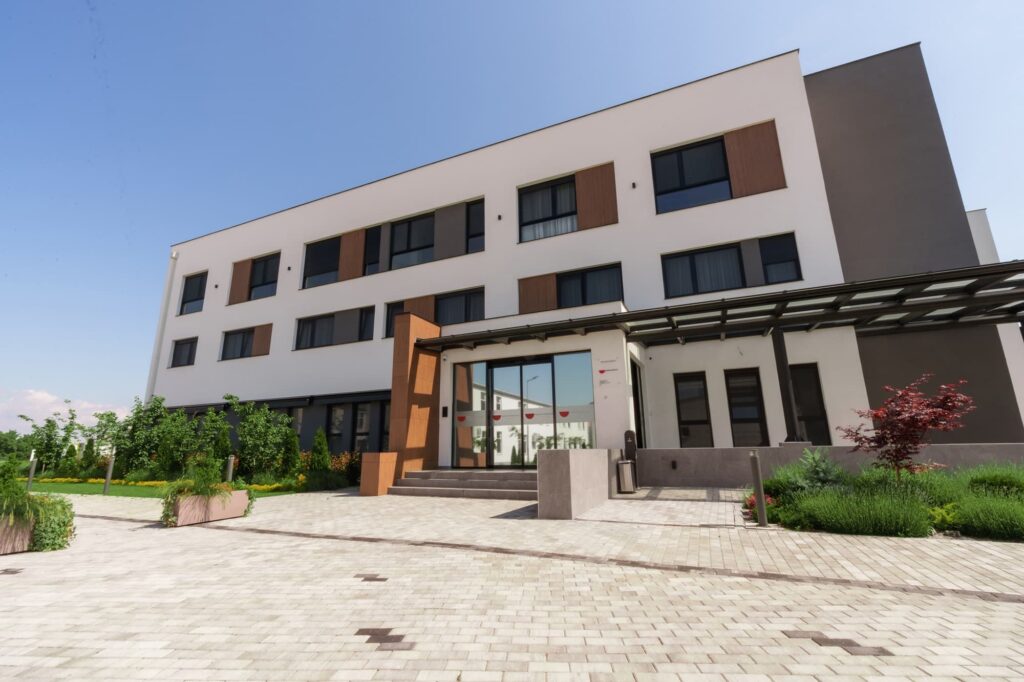The demand for stem cell therapy in Scotland is growing as more people seek innovative, non-surgical ways to manage chronic pain, neurological conditions, and degenerative diseases. There is a strong tradition of stem cell research in Scotland, but access to advanced regenerative treatments is currently limited to academic projects and small-scale private clinics.
For this reason, many Scottish patients are now exploring medically supervised options abroad—especially in Serbia, where clinics such as Swiss Medica offer safe, EU-regulated, and cost-effective regenerative programs.
What Is Stem Cell Therapy and Why Patients Consider It
Stem cell therapy uses the body’s own regenerative potential to repair damaged tissues, modulate the immune system, and reduce inflammation. Mesenchymal stem cells (MSCs), most commonly used in clinical practice, can be derived from a patient’s own bone marrow or adipose tissue or from ethically donated umbilical cord and placenta.
These cells migrate to areas of injury, releasing molecules that calm inflammation, stimulate healing, and support the recovery of normal function. Studies have demonstrated that MSCs are safe and hold promise in managing conditions like neurological disorders, autoimmune diseases, and joint degeneration.
Patients often consider stem cell treatment in Scotland or in other countries when conventional therapies no longer provide relief. The main goals are to improve mobility, reduce pain, slow disease progression, and enhance quality of life—without invasive surgery.
Get a free online consultation
If you have questions about how stem cell therapy works or want to understand whether it may be suitable for you, our regenerative medicine doctors are available for a personal conversation.

Medical Advisor, Swiss Medica doctor
Stem Cells in Scotland—The Current Landscape
The NHS in Scotland focuses mainly on hematological disorders such as leukemia and lymphoma through bone marrow transplantation. Advanced regenerative care for arthritis, neurological, or autoimmune diseases is not yet available within the public system.
Some private clinics advertise stem cell injections in Glasgow or similar procedures in other major cities. These are usually same-day treatments using the patient’s own fat or bone marrow, but not culture-expanded MSCs.
Academic institutions, such as the University of Edinburgh’s Centre for Regenerative Medicine, conduct world-class stem cell research in Scotland, yet practical access for patients remains narrow. The growing demand for regenerative therapies has therefore encouraged many to look abroad for comprehensive, clinically validated options.
Is Stem Cell Treatment in Scotland Legal and Regulated?
Yes, stem cell therapy in Scotland is legal—but under very strict regulation. Two main agencies oversee it:
- The Medicines and Healthcare products Regulatory Agency (MHRA)
- The Human Tissue Authority (HTA)
These institutions are responsible for organizing stem cell regulations in Scotland, including how human tissue and cell-based products are collected, processed and applied. Expanded stem cells or donor-derived MSCs can only be used within licensed clinical trials.

Such methods are legal but limited in efficacy compared to lab-expanded MSC therapies.
How Much Does Stem Cell Treatment in Scotland Cost?
Because availability is limited, private stem cell therapy in Scotland can be costly—ranging from £5,000 to £15,000 for small orthopedic or cosmetic procedures, with little post-treatment follow-up.
Comprehensive programs for neurological or systemic diseases are generally not available.
Below is an approximate comparison of local pricing and availability in Scotland’s two main medical centers:
| Availability | Average Cost Range | Notes | |
| Stem cell therapy in Glasgow | Limited private clinics | £5,000–£12,000 | Focus on autologous fat-derived procedures |
| Stem cell therapy in Edinburgh | Mainly research or pilot projects | £8,000–£15,000 | Often offered within clinical study settings |
Patients seeking full regenerative therapy—such as MSC or exosome-based programs—often compare Scottish clinics with EU destinations like Serbia, where the same medical standards apply, but costs can be up to 50% lower.
What Country Is Best for Stem Cell Treatment?
As regenerative medicine continues to evolve, patients are no longer limited to what is available in their home countries. Those who begin their search with stem cell therapy in Scotland often discover that local options are restricted to research programs or small private clinics. This naturally raises an important question: where can patients access proven, regulated, and affordable stem cell treatments today?
Defining “Best”: Outcomes, Access, Value
The best destination for regenerative medicine combines medical expertise, proven outcomes, safety, and fair pricing. Patients from Scotland often compare options across Europe—Germany, Spain, Switzerland, and Serbia—balancing regulatory strictness against practical accessibility.
Stem cells in Scotland and UK vs. Mainland Europe
Within the UK, MSC therapies remain confined to research. In continental Europe, many clinics operate under EMA and GMP standards, providing equivalent quality of care but with a broader range of applications and shorter waiting times.
When It Makes Sense to Go Abroad
Patients typically travel for treatment abroad when:
- Their condition is not treated locally;
- Waiting lists are long;
- They need an integrated program combining therapy, rehabilitation, and diagnostics.
Serbia has emerged as a particularly strong destination, offering all three—advanced protocols, multidisciplinary care, and transparent medical supervision.
Stem Cell Therapy in Serbia—What Sets It Apart
Serbia is now recognized as a leading European destination for regenerative medicine. Clinics such as Swiss Medica provide comprehensive, physician-supervised therapies combining stem cells, exosomes, and supportive treatments within one facility.

Key features include:
- Regulatory alignment: Licensed by national and EU-aligned health authorities
- Laboratory excellence: In-house GMP laboratory for cell cultivation and exosome preparation
- Multidisciplinary team: Neurologists, pediatricians, orthopedists, immunologists, and rehabilitation experts work together
- Personalized protocols: Each program is tailored after detailed medical assessment
- Affordability: 30–50% lower cost than Western Europe without compromising quality
- International patient care: English-speaking coordinators, airport transfer, translation, and post-treatment monitoring
Swiss Medica offers a range of advanced regenerative programs, such as stem cell treatments for MS, stem cells for arthritis treatment, and anti-age stem cell programs—all performed in compliance with European safety and ethical standards.
Real Stories—Insights from UK Patients
We greatly value the trust of our patients, which is why we have collected hundreds of reviews from patients around the world on Swiss Medica official YouTube channel. There, you can find genuine patient stories from patients who have travelled for stem cell therapy from Scotland, the UK, and around the world.
Autism
One of the families from the United Kingdom decided to bring their twin boys to Swiss Medica in Serbia after years of searching for effective autism therapies. The parents noticed that both children, born prematurely, were not speaking by the age of two. Having a medical background himself, the father researched stem cell therapy for autism and chose Serbia for its clear process, professional approach, and strong safety record.
Within just a few days after treatment, both boys began showing encouraging changes. The older twin became more talkative and started counting and saying simple words, while the younger one—previously unable to stay focused—became calmer, maintained better eye contact, and could finally sit through a cartoon.
“It’s still early days, but we already see positive signs. The staff was wonderful, everything was transparent, and our boys felt comfortable here. We’re truly grateful and hopeful for what’s ahead.”
Arthritis
A lifelong footballer, Heml developed early hip arthritis—“too soon for my age,” as he puts it. After physiotherapy and private consultations in the UK all pointed toward a hip operation he wasn’t ready to accept, he began researching alternatives and chose Serbia for donor-derived (placental/umbilical cord) cell therapy, availability, and proximity. At Swiss Medica, the pathway was clear from the start: airport pickup, medical evaluation with MRI/X-ray, and a structured program combining cell therapy with physiotherapy.
“The team has been wonderful,” he says. “Physios, nurses, doctors—caring, professional, and responsive.”
Even during his brief stay, he noticed early, slight improvement in morning pain and overall comfort. Traveling to an unfamiliar country felt safe:
“People are welcoming, the clinic is calm, and everything is well organized.”
His advice to others with degenerative hip pain: act sooner rather than later.
“If your scans confirm arthritis—genetic or wear-and-tear—don’t wait for things to worsen. I wish I’d come 18 months earlier. This isn’t a ‘miracle cure,’ but a proactive step that can help before surgery becomes the only option.”
Preparing Your Case—Documents, Imaging, and Labs
Before scheduling any procedure, doctors carefully evaluate each patient to confirm eligibility and set realistic expectations. This pre-assessment helps tailor the treatment program to your diagnosis, health status, and specific therapeutic goals.
To begin, you’ll be asked to share several essential medical documents:
- MRI or X-ray scans — particularly important for patients with orthopedic, neurological, or spinal conditions. Imaging allows specialists to assess the extent of tissue or nerve damage and plan the optimal administration method for the cells.
- Recent blood test results — including general hematology, biochemistry, and markers of inflammation. These tests help verify that there are no active infections or contraindications to cell therapy.
- Medical reports and diagnosis summaries — from your general practitioner or specialist, outlining your medical history, current symptoms, and previous treatments.
In some cases, the medical team may also request functional assessments or additional diagnostics to better understand your condition — for example, EMG tests for neuromuscular disorders or ultrasound for joint evaluation.
This detailed evaluation ensures that every treatment plan is personalized, medically safe, and designed to achieve realistic, measurable improvements rather than one-size-fits-all results.
Travel and Logistics—Simple and Supportive
Traveling for stem cell therapy from Scotland to Serbia is simple and convenient:
- Visa-free entry for UK citizens (up to 90 days)
- Airport transfers and translation services are provided by the clinic
All logistics—from transport to accommodation and post-treatment monitoring—are organized in one place, ensuring comfort and peace of mind for patients and their families.
Ready to Take the Next Step?
If you’re considering regenerative therapy, you can submit your medical records for a free, no-obligation consultation.
A specialist will review your case and provide realistic recommendations tailored to your diagnosis.
Contact us
Consultations include detailed guidance on travel, expected outcomes, and preparation steps—helping you make an informed decision about your health.

Medical Advisor, Swiss Medica doctor
FAQ
1. Can you get stem cell therapy in Scotland on the NHS?
Currently, the NHS provides stem cell therapy in Scotland only within clinical trials for specific blood and immune conditions. Regenerative treatments for neurological or orthopedic diseases are not yet offered through the NHS.
2. Are treatments abroad safe and approved?
Yes. Clinics that comply with EMA and GMP standards provide the same level of safety and medical oversight as those in other European countries. In Serbia, Swiss Medica follows EU-aligned ethical and quality regulations to ensure full patient safety.
3. What’s included in the treatment cost at Swiss Medica?
Unlike stem cell therapy in Scotland, programs at Swiss Medica typically cover medical evaluation, cell preparation, stem cell infusions, accommodation, supportive therapies, and follow-up monitoring.
4. Where is the cheapest country for stem cell treatment?
While costs vary, stem cell therapy in Scotland cannot be considered affordable, as it is generally limited to research settings and private treatments at high cost. Serbia, on the other hand, is widely considered among the cheapest country for stem cell treatment that still maintains European standards of safety and professionalism.
List of References:
Zeng, L., Liu, C., Wu, Y. et al. Efficacy and safety of mesenchymal stromal cell transplantation in the treatment of autoimmune and rheumatic immune diseases: a systematic review and meta-analysis of randomized controlled trials. Stem Cell Res Ther 16, 65 (2025). https://doi.org/10.1186/s13287-025-04184-x
MD, Pediatrician, Regenerative Medicine Specialist







